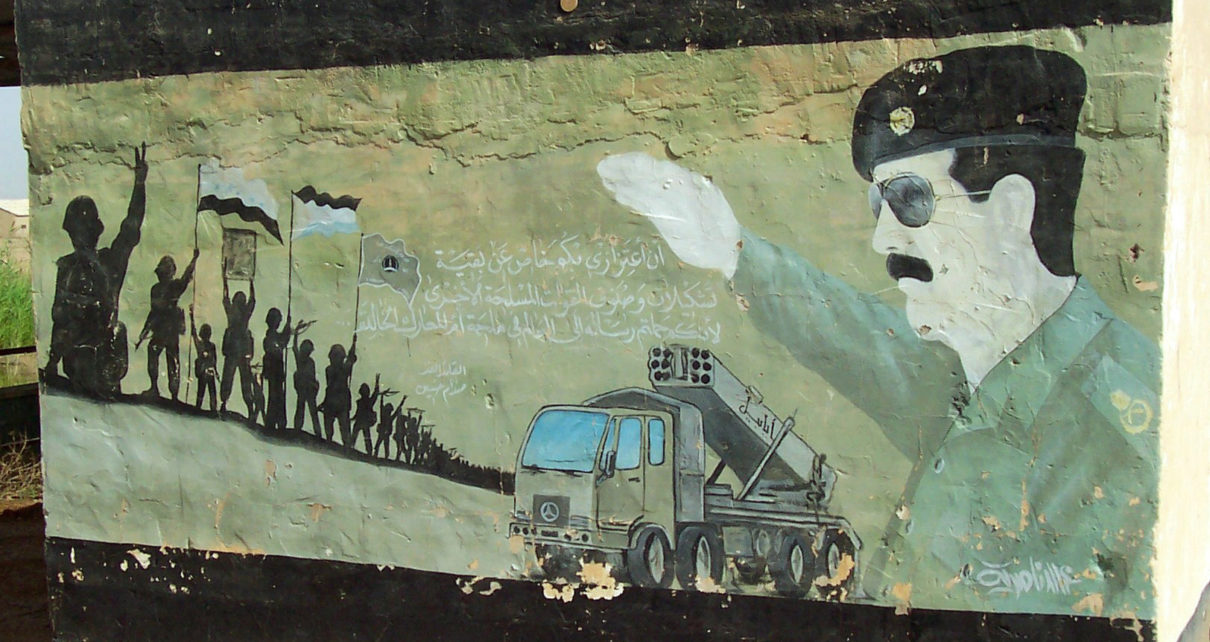From the tightly choreographed mass parades of North Korea to the rambling speeches of former Libyan president Muammar al-Gaddafi, the behaviour of authoritarian regimes can often appear nonsensical. This style of diplomacy also includes the behaviour of Putin’s Russia and Saddam Hussein’s Iraq, both of which turned to issuing blatantly false and defiant official statements about the state of their respective wars. In regards to Russia, officials have recently blamed the West for instigating a global food shortage due to its sanctions, even while its military continues to blockade Ukrainian ports. And Iraq infamously claimed that the coalition invasion would fail, even while the US military was entering Baghdad. The patent absurdity of these claims, however, shields their broader meaning and impact within international politics. Rather, this style of propaganda, marked by its confrontational tone and its basis on particularly flagrant falsehoods, is often a reflection of the internal dynamics of authoritarianism and a direct response to the influence operations of democracies.
To complement its strategy of mass missile and artillery strikes on civilian populations and along the front lines of the Donbas region, Russia has also sought to starve the Ukrainian population to weaken their resistance and place greater pressure on the West to remove their sanctions. While continuing to blockade Ukraine’s Black Sea ports and stymying Ukraine’s agricultural exports, the Russian military has also been involved in stealing thousands of tons of grain and hundreds of farm implements for resale on the international market to finance its war effort. In addition to its effects on the immediate combatants, Russia’s efforts have also contributed to a global food shortage, particularly within Africa and the Middle East.
Further, along with precipitating these shortages, Russia has also launched a series of disinformation campaigns within affected regions, alleging that illegal Western sanctions, rather than its behaviour, are responsible for the current crisis. Spread through official government statements such as a speech given by Russia’s Foreign Minister Sergey Lavrov on Africa Day, these claims have become widespread across Russian-backed media channels such as RT Arabic, which is broadcast across Africa and the Middle East. These efforts, representing an attempt to turn global public opinion against the West by repeating easily disprovable lies, highlights a past strategy often used by other authoritarian regimes, such as Saddam Hussein’s Iraq.
During the immediate run-up to the Iraq War, Iraqi Information Minister Mohammed Saeed al-Sahaf, famously known as ‘Baghdad Bob,’ continued to hold a series of daily news conferences to offer updates on the state of the conflict. During these events, al-Sahar confidently predicted that the US would be ruinously defeated and that the US military was in the process of collapsing. He also denounced the leaders of the coalition, particularly US President George W. Bush, as criminals and imperialists. These conferences, which rapidly became an international media sensation, often featured al-Sahaf defiantly claiming that an Iraqi victory was imminent even as the invasion force drew closer to the outskirts of the capital, highlighted by a US armoured column once appearing in one of the shots from a television camera. Remaining committed to his official position until the collapse of Saddam’s government, al-Sahaf eventually surrendered to American forces after the fall of Baghdad before being quietly released by the coalition.
While defiant and blusterous rhetoric during periods of intense conflict is an integral aspect of war, the strategy adopted by Russia and Iraq highlights several interrelated phenomena that illustrate why such behaviour may be more common among authoritarian regimes. A style of diplomacy centred on echoing blatant falsehoods may merely be a reflection of a state’s domestic politics, captured by the concept of the dictator’s dilemma, in which a leader either cannot or refuses to differentiate between truth and fiction as methods for gauging public opinion. This description suits both contemporary Russia and Saddam’s Iraq, as a highly insulated political elite appeared to be unable to respond to political and military realities, resulting in a high-profile catastrophe, such as Russia’s failed invasion of Kiev or the coalition’s swift defeat of the Iraqi military. In conjunction with these circumstances, authoritarian regimes are also theoretically insulated from public opinion, allowing such governments to lie with relative impunity to their own populations and to the international community due to a lack of a need to justify its behaviour.
Further, both Russia and Iraq’s propaganda, while focusing on the US, was primarily targeted towards countries whose relationships with the US are often fraught with accusations of neocolonialism. For Russia in particular, its disinformation campaign is designed to weaken the US’ leadership of the rules-based international order by eroding its soft power as a law-abiding nation, rather than attempting to convince the citizens of Western democracies of Russia’s innocence. This strategy also highlights a central contrast with the influence campaigns of democracies, which often revolve around highlighting the benefits of liberal governance, as evidenced by the US’s continual efforts at democracy promotion abroad. Rather than echo these campaigns and promote authoritarianism directly, many autocratic regimes, cognizant of their poor image, instead rely on campaigns that emphasize democracy’s shortcomings. This practice is exemplified by Russia’s tactic of “whataboutism”, which routinely seeks to establish false equivalences between its behaviour and the behaviour of the West. Even as the Hussein regime’s efforts to bluff its way into a victory against the US failed dramatically, Russia’s propaganda may accelerate the turn of global opinion against the West’s efforts in Ukraine, particularly as food shortages become more acute and the war continues. Further, Russia’s theft of Ukrainian grain has the more immediate advantage of allowing Putin’s government to fund a war machine whose actions serve to raise Russia’s profit margins by severing supply chains. However, blatant lies, while seemingly at best a productive policy option and at worst a harmless demonstration of defiance, also often highlight the fundamental weakness of the regimes using them. Indeed, if the truth were beneficial to their cause, they would tell it.
Image copyright: “Saddam Hussein Mural by Jim Gordon, civilian, August 2005” by Department of Defense via Flickr. Licensed under Public Domain Mark 1.0
Disclaimer: Any views or opinions expressed in articles are solely those of the authors and do not necessarily represent the views of the NATO Association of Canada.




